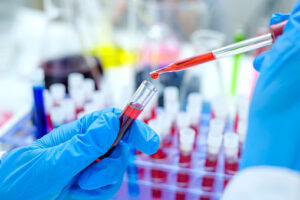During the early outbreak of SARS-CoV-2 in Italy, medical doctors and researchers observed a high frequency of positive direct antiglobulin tests (DAT, also known as Coombs test) in patients with COVID-19. They studied 113 hospitalized patients with COVID-19 during one week (April 6-13, 2020). All of the patients (mean age 63.5 years) received multiple drug therapies but none received convalescent plasma. Almost half of the patients (52/113, 46%) had a positive DAT using a microscreening assay; 46 patients were positive for IgG only, 4 were positive for IgG and C3d, and 2 were positive for C3d only. Furthermore, patients with a positive DAT were significantly more likely to have lower hemoglobin levels and receive RBC transfusions compared to those with a negative DAT (P<0.01 for both comparisons). Intriguingly, elutes from DAT positive patients with COVID-19 did not react with a commercial panel of RBCs or with healthy donor RBCs in an indirect antiglobulin test but did react with a panel of RBCs prepared from DAT-negative patients with COVID-19. Drug interference could not be totally ruled out since data on medications were not complete. These results suggest that RBCs in at least some patients infected with SARS-CoV-2 may be modified and add more evidence that immune-mediated mechanisms may be contributing to the pathogenesis of COVID-19.
References:
- Berzuini A, Bianco C, Paccapelo C, Bertolini F, et al. Red cell-bound antibodies and transfusion requirements in hospitalized patients with COVID-19. Blood 2020; 136(6): 766-768.
- Hendrickson JE and CA Tormey. COVID-19 and the Coombs test. Blood 2020; 136(6): 655-656.

